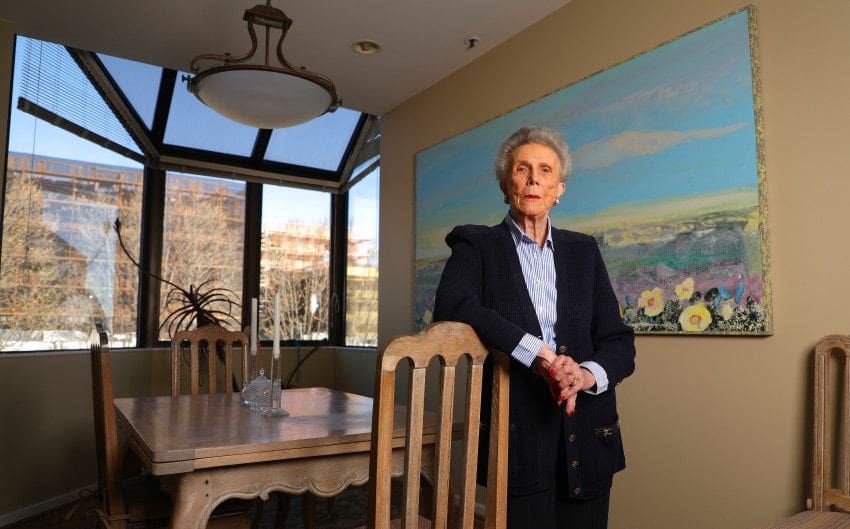By: DAN PINE
See original article here: https://jweekly.com/2022/10/21/why-this-s-f-survivor-holocaust-supports-universal-basic-income/
Looking at Gisèle Huff today, elegantly dressed, perfectly coiffed, gliding from board meeting to board meeting, it’s hard to believe the nonprofit executive started out life as a hidden Jewish child in Nazi-occupied Paris.
That long journey from the Holocaust to the halls of power in her adopted country makes for quite the American success story.
Huff, 86, tells that story in her newly published autobiography, “Force of Nature: The Remarkable True Story of One Holocaust Survivor’s Resilience, Tenacity, and Purpose.” It’s part memoir, part call to arms on behalf of her most cherished social cause: universal basic income. At its core, the book is the tale of a Jewish woman who never gave up, despite long odds and unbearable sorrows.
“The motivating factor of [Judaism] is to change the world for the better,” says Huff, who lives in San Francisco. “I do think it’s in the bloodstream.”
The granddaughter of Yiddish-speaking Russians who immigrated to Paris, Huff was only 4 when Hitler invaded her native France. Ultimately, her father and those grandparents were murdered by the Nazis, while she and her mother went into hiding. Until liberation in 1945, Huff passed as a Catholic girl.
What she remembers most vividly was the constant fear. “I didn’t feel protected at all,” she recalls. “I was scared every minute of every day. That was the atmosphere.”
And yet, the trauma had one positive effect on her. “The most significant thing my horrendous childhood gave me is a love of life,” she says. “How precious it is every day. I live for the moment. For me, there is no middle ground: Either you live, or you do yourself in.”
When she was 11, she and her mother immigrated to the United States, settling in New York. In time, she mastered English, married, bore two children and found her way to a fulfilling career.
Huff earned a Ph.D. in political science, with a concentration in political philosophy, at Columbia University, taught and later sat on the advisory board for Harvard University’s Education Policy and Analysis Program. For 12 years, she also served as director of development at San Francisco University High School, and for more than 20 years held the post of executive director at the Jaquelin Hume Foundation, an S.F.-based education reform nonprofit.
She also has visited schools to speak to students about her Holocaust experiences.
As an education reformer, she was able to befriend a diverse group of politicians, from liberal New Jersey Sen. Cory Booker to former Republican Florida Gov. Jeb Bush. A longtime devotee of libertarianism, she made a run for the House of Representatives in 1998 — as a Republican — but lost in the primary for the 6th Congressional District (Marin and much of Sonoma County).
There is no word to describe what it is to lose a child … But the world still goes on. I feel he is with me every minute that I’m doing the things I do to continue his dream.
Huff made a sharp political turn late in life when her son, Gerald Huff, a Tesla engineer and universal basic income activist, persuaded her that UBI was a social necessity, given the upheaval technology and other factors play in modern economic life.
UBI posits that all Americans over age 18, regardless of socioeconomic status, should receive a monthly check — $1,000 is often proposed — “sufficient to secure basic needs as a permanent earnings floor no one could fall beneath,” according to Basic Income Today. “UBI would be a promise of equal opportunity, not equal outcome, a new starting line set above the poverty line.”
Gerald Huff died of pancreatic cancer in 2018 at age 54. Gisèle, already widowed by that point, reeled from the loss (her husband, Paul, also had died of pancreatic cancer, also at age 54, in 1987).
But she rebounded, founding in her son’s honor the Gerald Huff Fund for Humanity, which promotes UBI efforts around the country.
It’s significant to transform from a low-tax, small-government conservative into a UBI enthusiast, but Huff has made that journey. She says the main objection she hears from wealthy people skeptical of UBI is something like, “Most people will stop working.” Her response to her millionaire friends: “Have you stopped working?”
“People aren’t going to stop working because you give them $1,000 a month,” she adds. “You can’t live on it. It’s a floor.”
The Gerald Huff Fund for Humanity is a family affair. In addition to Huff, who serves as president, daughter Michèle Huff, a Berkeley attorney, sits on the board, as does Gerald Huff’s lifelong friend, business consultant Stephen Kuhn. The S.F.-based foundation works to promote the understanding, acceptance and implementation of UBI and supports UBI pilot programs around the country.
Working with her foundation has helped Huff cope with the loss of her only son.
“It is unimaginable,” she says of Gerald’s death.
“It’s beyond devastating. There is no word to describe what it is to lose a child. It completely upends the order of things. But the world still goes on. I feel he is with me every minute that I’m doing the things I do to continue his dream.”
With a new book out, Huff knows she has to promote it like any other author. She’s done several interviews already and is willing to stretch beyond what she’s used to in order to spread her message.
“I like to see results,” she says, “so it’s a question of getting people talking about it. I don’t do TikTok. I hope I meet someone who knows it.”





















